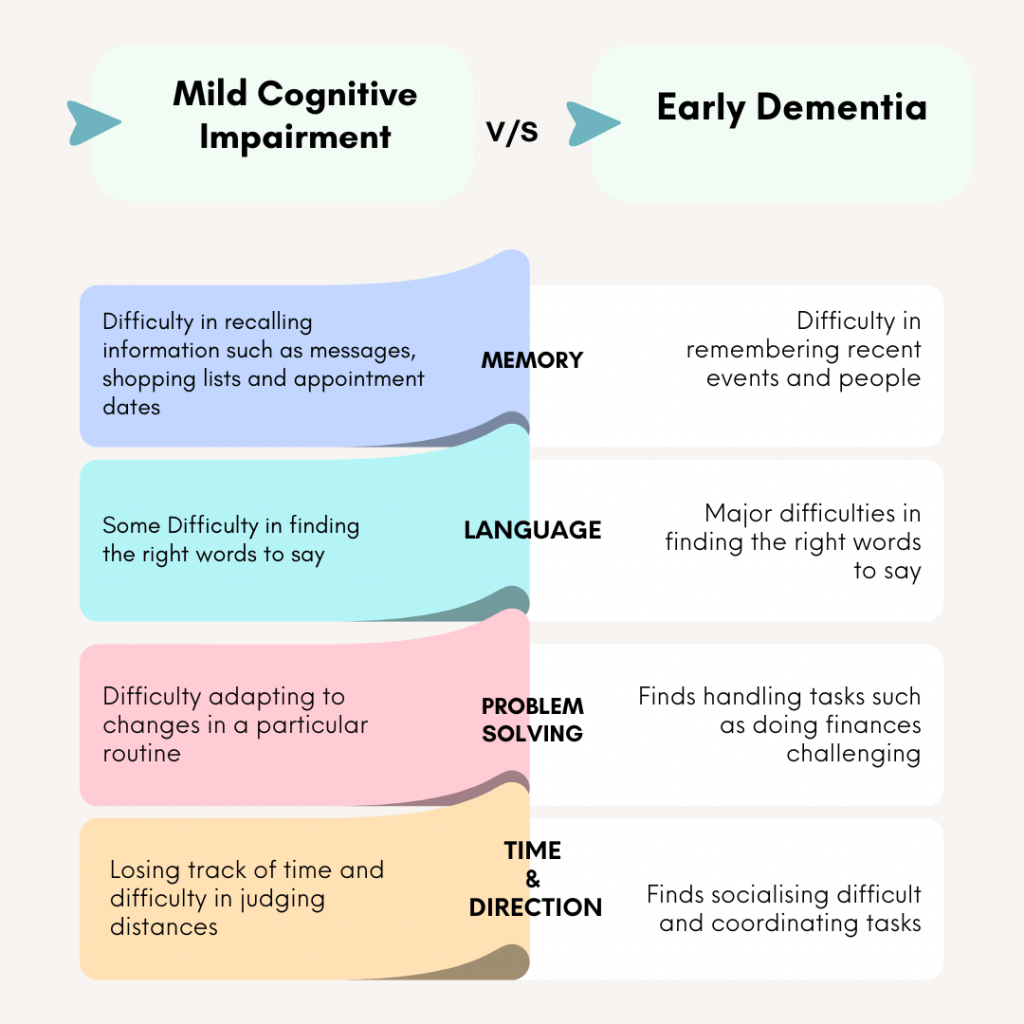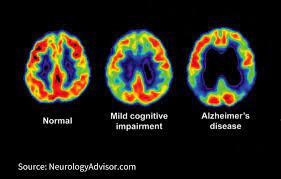Cognitive changes are a natural part of aging, but distinguishing between normal age-related decline, Mild Cognitive Impairment (MCI), and dementia is crucial. While MCI represents a subtle shift in cognitive abilities, dementia signifies a more severe decline that can drastically impact daily life. Recognising these differences early allows individuals and caregivers to take proactive steps toward better brain health and support.
MCI: A prelude to Dementia
What is Mild Cognitive Impairment (MCI)?
Mild Cognitive Impairment (MCI) is a condition that exists between normal cognitive aging and more serious neurodegenerative conditions like dementia. People with MCI may notice occasional memory lapses, difficulties with problem-solving, or mild forgetfulness. However, these challenges do not significantly disrupt daily life.
For instance, someone with MCI might forget an appointment but remember it later or need a bit more time to recall a name. Routine activities such as managing finances, preparing meals, or maintaining social engagements are still manageable, often with minor adjustments.
The key distinction lies in the level of independence retained. Individuals with MCI can continue living their daily lives without needing extensive support, although the changes can serve as a warning sign for potential progression to dementia.
People with MCI may experience:
- Occasional memory lapses.
- Mild challenges in problem-solving.
- Minimal disruption to daily life.
Dementia: A serious impact on cognition
Dementia on the other hand, refers to a group of symptoms that signify a more profound and progressive decline in cognitive abilities. It affects several brain functions, including:
- Memory: Forgetting not just names but entire conversations or events.
- Language: Difficulty finding words or following conversations.
- Thinking: Struggles with logic, decision-making, and concentration.
- Behaviour: Changes in mood, personality, or social behaviour.
Unlike MCI, dementia significantly impacts a person’s ability to carry out everyday tasks. For example, managing finances, cooking meals, or even remembering how to use familiar objects can become overwhelming. These challenges often necessitate caregiver support for day-to-day activities.
Do you know how MCI and Dementia differently affect daily life?
- MCI: It causes minimal disruption to routine activities.
- Dementia: It presents significant challenges in independently managing day-to-day tasks.
Delving deeper into the key differences

Why Early Recognition Matters
The ability to identify cognitive changes early can make a significant difference in quality of life. When MCI is diagnosed promptly, individuals can implement lifestyle changes that support brain health and potentially slow cognitive decline. These changes may include:
- Following a healthy diet, such as the Mediterranean or DASH diet.
- Engaging in regular physical activity.
- Maintaining social connections and mental stimulation.
For those with dementia, recognising the symptoms allows for timely intervention. Care plans, support services, and resources can improve both the individual’s and the caregiver’s experience. By understanding the progression from MCI to dementia, families can prepare for the future with the appropriate resources and strategies in place.
Key Takeaways
Understanding the difference between MCI and dementia empowers individuals and caregivers to make informed decisions. Here are the most important points to remember:
- MCI is subtle: Memory lapses and mild cognitive challenges are noticeable but do not interfere significantly with daily life.
- Dementia is severe: It disrupts memory, language, thinking, and behaviour, requiring substantial support for daily tasks.
- Early action is vital: Identifying MCI early can delay progression, while timely dementia care improves quality of life.
Taking Proactive Steps with Ivory
Brain health is at the core of everything we do at Ivory. Our tools are designed to help individuals and caregivers navigate the complex world of cognitive health. Whether you’re noticing early signs of MCI or managing dementia, we’re here to provide support.
At liveivory.com, you’ll find:
- Expert resources on cognitive health and neurodegenerative conditions.
- Gamified assessments to identify cognitive changes.
- Personalised brain workouts to enhance mental agility.




